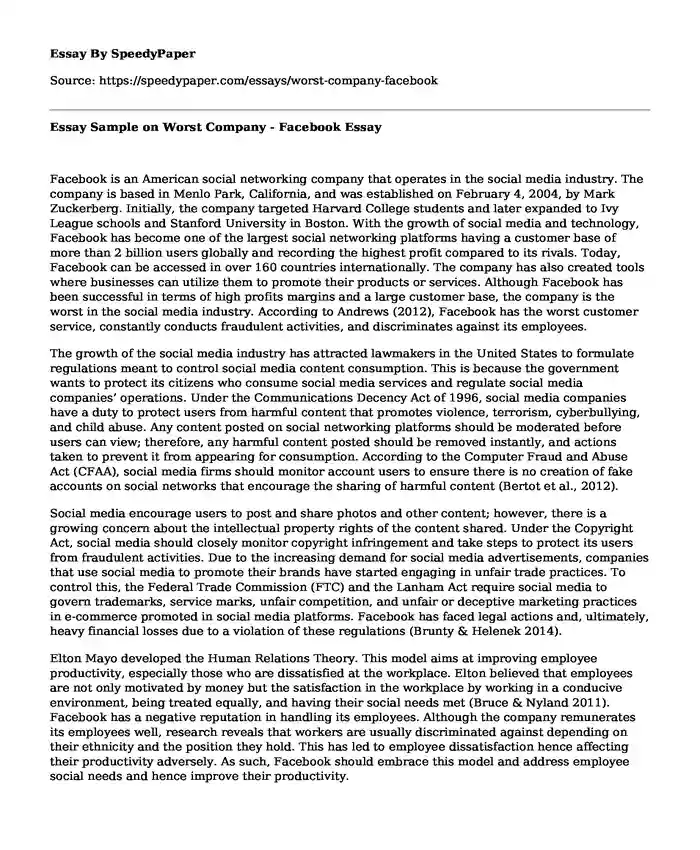
| Type of paper: | Essay |
| Categories: | Facebook Social networks Analysis Social media |
| Pages: | 3 |
| Wordcount: | 699 words |
Facebook is an American social networking company that operates in the social media industry. The company is based in Menlo Park, California, and was established on February 4, 2004, by Mark Zuckerberg. Initially, the company targeted Harvard College students and later expanded to Ivy League schools and Stanford University in Boston. With the growth of social media and technology, Facebook has become one of the largest social networking platforms having a customer base of more than 2 billion users globally and recording the highest profit compared to its rivals. Today, Facebook can be accessed in over 160 countries internationally. The company has also created tools where businesses can utilize them to promote their products or services. Although Facebook has been successful in terms of high profits margins and a large customer base, the company is the worst in the social media industry. According to Andrews (2012), Facebook has the worst customer service, constantly conducts fraudulent activities, and discriminates against its employees.
The growth of the social media industry has attracted lawmakers in the United States to formulate regulations meant to control social media content consumption. This is because the government wants to protect its citizens who consume social media services and regulate social media companies’ operations. Under the Communications Decency Act of 1996, social media companies have a duty to protect users from harmful content that promotes violence, terrorism, cyberbullying, and child abuse. Any content posted on social networking platforms should be moderated before users can view; therefore, any harmful content posted should be removed instantly, and actions taken to prevent it from appearing for consumption. According to the Computer Fraud and Abuse Act (CFAA), social media firms should monitor account users to ensure there is no creation of fake accounts on social networks that encourage the sharing of harmful content (Bertot et al., 2012).
Social media encourage users to post and share photos and other content; however, there is a growing concern about the intellectual property rights of the content shared. Under the Copyright Act, social media should closely monitor copyright infringement and take steps to protect its users from fraudulent activities. Due to the increasing demand for social media advertisements, companies that use social media to promote their brands have started engaging in unfair trade practices. To control this, the Federal Trade Commission (FTC) and the Lanham Act require social media to govern trademarks, service marks, unfair competition, and unfair or deceptive marketing practices in e-commerce promoted in social media platforms. Facebook has faced legal actions and, ultimately, heavy financial losses due to a violation of these regulations (Brunty & Helenek 2014).
Elton Mayo developed the Human Relations Theory. This model aims at improving employee productivity, especially those who are dissatisfied at the workplace. Elton believed that employees are not only motivated by money but the satisfaction in the workplace by working in a conducive environment, being treated equally, and having their social needs met (Bruce & Nyland 2011). Facebook has a negative reputation in handling its employees. Although the company remunerates its employees well, research reveals that workers are usually discriminated against depending on their ethnicity and the position they hold. This has led to employee dissatisfaction hence affecting their productivity adversely. As such, Facebook should embrace this model and address employee social needs and hence improve their productivity.
In summary, social media has become a game-changer in almost everything that surrounds it. This has led to the formulation of regulations to control the operations of social media companies. Although social media firms are protected by section 230 under the First Amendment from various civil liabilities and state criminal prosecution, they should promote responsible content for consumption.
References
Andrews, L. (2012). Facebook is using you. The New York Times, 4.
Bertot, J. C., Jaeger, P. T., & Hansen, D. (2012). The impact of polices on government social media usage: Issues, challenges, and recommendations. Government information quarterly, 29(1), 30-40.
Bruce, K., & Nyland, C. (2011). Elton Mayo and the deification of human relations. Organization studies, 32(3), 383-405.
Brunty, J., & Helenek, K. (2014). Social media investigation for law enforcement. Routledge.
Norton Rose FulBright (n.d), Glossary of US Laws | Social Media Law Bulletin. Social Media Law Bulletin. (2020). Retrieved 12 June 2020, from https://www.socialmedialawbulletin.com/glossary-of-us-laws/.
Cite this page
Essay Sample on Worst Company - Facebook. (2023, Aug 28). Retrieved from https://speedypaper.com/essays/worst-company-facebook
Request Removal
If you are the original author of this essay and no longer wish to have it published on the SpeedyPaper website, please click below to request its removal:
- Free Essay: A Case Study of Samsung Employees' Relations
- Artificial Intelligence Research - Free Essay Sample
- Cardinal Richelieu Essay Example
- User Interface Analysis in Our Free Essay for Everyone
- Essay Sample: Management of Culcinema
- The 5S System Lean Manufacturing Methodology. Free Essay
- Technology's Role in Elections - Free Essay Sample
Popular categories




